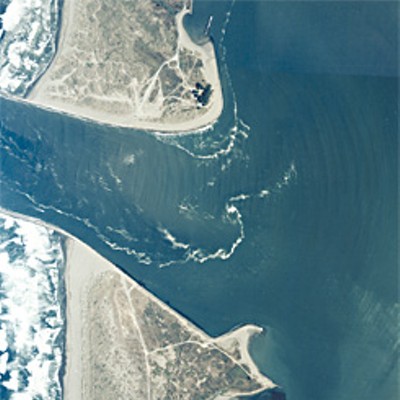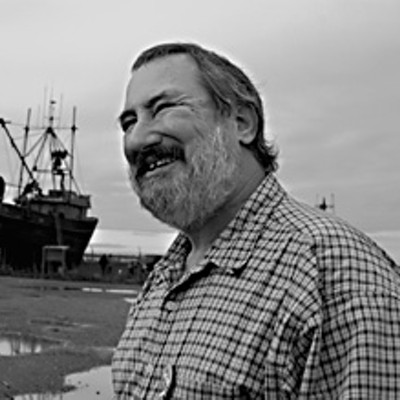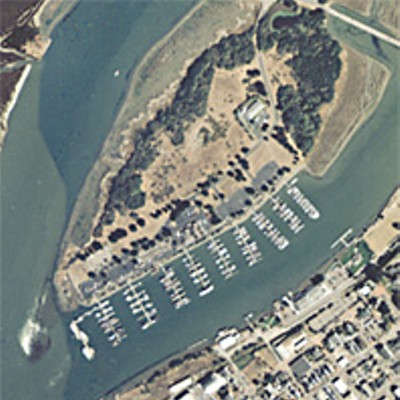A boat is a hole in the water you pour money into. At least that’s what I’ve always been told.
But when it comes to the five candidates running for the Humboldt Bay Recreation and Conservation District Commission, that saying is one of the few things they can agree to disagree with. All of them believe that developing the bay is central to bringing back economic prosperity and job growth to the county, and that can’t happen without boats. For some, that means primarily kayaks and fishing rigs. For others, it’s big container ships. Deciding exactly what kind of development is best for the bay is a contentious matter.
The two septuagenarian incumbents from the Second and Fifth Division — Roy Curless and Charles Ollivier, respectively — believe that rebuilding the port’s shipping infrastructure so as to attract foreign capital is the way to go. Challengers Pat Higgins (Fifth Division), as well as Carlos Quilez and Steven Morris (both from the Second Division), think that the proverbial ship has already sailed on that project and attention ought to be shifted to pursuing more immediate and realistic goals.
It’s been said in the Journal before that the Harbor District is one of the county’s most important governmental bodies, outside county government and the seven incorporated cities (see “State of the Bay,” Oct. 27, 2005), and it deserves to be said again. The Harbor District’s five-member board of commissioners — elected from each of the county’s five supervisorial districts — oversees the management of Humboldt Bay, including heavy industry, mariculture, recreation and environmental protection, in addition to controlling a budget of $3 million. Moreover, the Harbor District’s sphere of influence extends beyond the bay to include the railroad, which is tied up with plans to turn the bay into a deep-water port and a hub for Asian goods on their way into the greater American marketplace.
On Nov. 6, two seats on that commission are up for grabs: one in the Second Division — Fortuna, Hydesville, Bridgeville, Garberville — and another in the Fifth Division — McKinleyville, Trinidad, Orick, Blue Lake, Willow Creek, Hoopa. This year’s round of elections is particularly important because the outcome could tilt the commission in an entirely new direction — displacing a dynasty of sorts which, for the past 16 years, has been working and waiting for big shipping interests to sail in and save the day.
FIFTH DIVISION
Division Five commissioner and incumbent Charles Ollivier is the lead advocate of total-makeover deep-port development. He’s been singing its praises since he first got elected 16 years ago, and he thinks his pet project has finally reached the home stretch. But his campaign platform may turn out to be a widow’s walk in the end.
“This is perhaps the most important election we’ve seen in this county for many years,” he said to me the week before last as we stood atop Bell Hill, looking out over Humboldt Bay.
Ollivier is a bon vivant. A retired longshoreman, his laugh is hearty and his hopes are high. His mantra is: “We can have it all.” That is, a working railroad, a successful port, living-wage jobs, a healthy bay and a bicycle trail connecting Eureka and Arcata. He pointed to the Redwood Dock in the drizzly distance, which the district recently acquired through a one-time lease buy-out. The barrel-chested 71-year-old resembles an opera singer, his hair brushed back in a froth-crested wave and his face contorting dramatically as he described his grand scheme for the bay.
There’s no doubt his enthusiasm is genuine.
“The Redwood Dock will be developed,” he said resolutely, gesticulating as he spoke, his slight French accent causing the ends of his sentences to crescendo. “We’ll make enough money from the Redwood Dock as a marine terminal to reinvest it in recreation and conservation.”
He recommends looking north to Prince Rupert, British Columbia for inspiration. Like in Humboldt County, a downturn in the logging and fishing industries once spelled disaster for that Canadian port. They even lost their pulp mill, but now they’re back on their feet running a profitable container port. “If you look into Prince Rupert, it sounds just like Humboldt Bay,” Ollivier told me with a nostalgic twinkle in his eyes.
In some respects, though, the comparison doesn’t hold up. Prince Rupert is strategically located on the occidental end of the shortest existing land/sea route connecting Asia and North America — 1,000 miles/68 hours closer to Shanghai than the port of Los Angeles. It’s also located at the terminus of a transcontinental railroad operated by Canadian National Railway. And their bay is naturally deep, ranging between 38 and 44 meters. On all three counts, our bay is no match.
Ollivier told me that when he first got elected to the Harbor Commission the “direction turned towards shipping port development.” That was 16 years ago. He doesn’t seem phased by how plodding progress has been. “Things move slow,” he admitted. So is one more term long enough for some real changes to occur? Ollivier certainly thinks so: “The climax is about to come for my 16 years of labor here,” he said.
• • •
Pat Higgins, Fifth Division candidate.Photo by Yulia Weeks
Pat Higgins and I met the week before last on a cold morning beside Highway 101, where Rocky Creek flows into the bay. The trail to get there winds through a field of grazing cattle, then under the highway and the railroad bed.
Higgins, a fisheries biologist, is a bit nerdish. He wears big-framed glasses and waxes scientific whenever he has the chance. His toothy smile is infectious. Standing by the mouth of Rocky Creek, Higgins took off his raincoat and threw it in the grass, brandishing a pin on his shirt with “Pat Higgins Humboldt Bay District Commissioner 5th Division” on it, and a picture of a fish.
The tide was out and the mucky patch of bay beside us was stubbled with pickle weed and rushes. It didn’t look like much to me, but Higgins explained that Rocky Creek had been reconnected to the bay, opening up a passage for fish.
“As we reconnect these passages to the bay, salmon runs should flourish,” he said. According to Higgins, there are plenty more creeks that need our attention if mariculture is to thrive in the bay. And since a healthy bay will translate into a healthy economy, he thinks we need to do more to clean up pollution.
But fish habitats aren’t the only things that need reconnecting, according to Higgins. He wants to see Eureka and Arcata connected by a trail. A cyclist passed by on the highway — “risking his life” — as Higgins explained how a trail would not only bolster tourism but also encourage healthier lifestyles among HumCo residents.
Higgins, who has 20 years of conservation experience, feels that the Harbor District hasn’t done enough to protect the bay’s natural resources.
“They’ve hosted conferences where restoration is discussed but they should take a lead role in conservation,” he said. “The Bay District should not be confined to industrial development.”
In fact, the idea of creating a container port, and the supposedly hundreds or thousands of jobs that Charles Ollivier claims it will provide, is “not a viable plan,” he said. “It sets up false hopes.”
“We need to look at shipping needs more realistically ... and create opportunity through recreational infrastructure,” he said. That means creating water trails for kayaks, more points of entry for boats and setting up kiosks and restrooms to make recreation on the bay more practical and accessible, Higgins said.
Higgins said he is disappointed with the lack of accountability he sees within the Harbor District. And as a scientist who is still active in research projects, he said, he knows exactly how important accountability is.
SECOND DIVISION
Carlos Quilez, Second Division candidate.Photo by Yulia Weeks
Carlos Quilez, a Starvation Flats resident and Second Division candidate, thinks the present Harbor Commission has put all its eggs in the wrong basket. “When people talk about Prince Rupert and Humboldt Bay, they are talking about apples and elephants,” he said as we stood near the boat dock in Fields Landing. He’s concerned about how unrealistic the incumbents’ plans for port development are.
“We have these big plans to do things because people remember what it is we had. We have to work with what we have and not what we had and lost,” he said. Then he qualified his statement: “These are all very well intentioned people.”
Though not a long-time resident of the county, Quilez has been involved in local politics before. He’s the president of the Friends of Small Places, an environmental advocacy group focused on the downsides of gravel extraction. A retired administrative planner at San Jose State University (SJSU), he wants to bring accountability and transparency to the Harbor District — which, he noted, is operating at a deficit. That’s because the harbor commissioners don’t know how to manage money, he explained. At SJSU, which has an annual budget of $380 million, he was involved in finding ways to spend some of those moneys more wisely and efficiently to improve academic programs.
To see the Commissioner’s planning skills in action, he recommends taking a gander at the District’s most recent five-year plan, which opens by stating that it will explain the District’s priorities for 2007-2011 “at the highest level of abstraction.”
“What is that? Is that reality?” Quilez asked rhetorically. “They have no business sense, no cost analysis, no timelines and no benchmarks ... How can they measure success?”
Quilez claims that his solutions for the bay are more grounded in reality. He gestured around at the boat dock. “I want to pursue getting our money back to do clean-up here.” Fixing the harbor’s recreational infrastructure will create jobs immediately, he said.
There is work to be done in Shelter Cove another port overseen by the commission. Quilez feels that area’s denizens are disenfranchised because they’re geographic outliers in the commercial port scheme being pushed by the “present administration.” Their problems have been neglected, he said.
Jim Blewett, president of the Shelter Cove Pioneers, a local social organization, agrees. He told me over the phone last Monday that a big concern for his group is that the Harbor Commission is too Eureka-centric. Quilez hopes to change that. “I want to ensure that all of the people in the Second District have open and proactive governance,” he said.
At a recent forum held by the Pioneers, Quilez was the only candidate to show up. Blewett said he’d heard that the Second District’s incumbent Roy Curless only planned to campaign as far south as Fortuna.
Quilez thinks he can get more done than the incumbent has during his long tenure in office. “In 16 years of service, we should expect more of the common sense improvements we don’t have here,” he said.
• • •
Division Two Commissioner and incumbent Roy Curless.Photo by Yulia Weeks
Roy Curless couldn’t imagine anything farther from the truth. According to him, a lot has been accomplished on his watch. The 77-year-old Fortunan and former president of the Fortuna Rodeo Association and the Fortuna Rotary Club greeted me in his Harbor District office week before last. Curless is tall with hawkish features. Looking down I noticed grey round-toed cowboy boots poking out from beneath his dress slacks.
Seated stiffly behind his desk, he told me that $1.7 million in grants had recently been appropriated to repair the breakwater at Shelter Cove. And at King Salmon, the Harbor District put in a groin to prevent waves from washing out the road there. As a result, “There’s sand, there’s beach and the kids can play and have a great time,” he said. “I think the Harbor District saved the day on that.”
As for port development, Curless — at least initially — seemed less gung-ho than Ollivier. “I don’t think there’s going to be big container ships,” he said. Nonetheless, he’s pleased the Harbor District hired Wilson Lacy, the former director of maritime operations for the Port of Oakland.
“We are looking at a company to come in here — whether it is from the Pacific Rim or Europe or wherever,” Curless said. “That’s what I’m looking for, someone to come in and rebuild the Redwood Dock. That way we could get container ships to come in and we would have a first-class dock.”
I pointed out that the Harbor District is operating at a loss and yet it has hired “an expert in goods movement” (Curless’s description). Moreover, in the 2003 Port of Humboldt Bay Harbor Revitalization Plan, which was co-funded by the Harbor District, the City of Eureka and Humboldt County and drafted by PB Ports & Marine Inc., it clearly states that the idea of Humboldt Bay ever becoming a container port is “unattractive” and of the “lowest priority.”
“It may be low priority to some people,” Curless said. “But to me, why, you have to plan ahead. Right now I’m not thinking of the present time, but somewhere down the road we have to be prepared to take on these ships. Because as more commerce keeps coming into California, why, if we don’t take advantage of that, why, we’re going to have a problem with the other ports being just overwhelmed with these ships.”
I also asked Commissioner Curless about a $170,000 loan that the Harbor District gave to the North Coast Railroad Authority (NCRA) in 2006 and which was investigated by the Humboldt County Grand Jury. In its 2007 report, the Grand Jury said it “could find no provision in the District’s charter granting statutory authority to use their fund money to act in the capacity of a financial institution.” The NCRA subsequently failed to pay off that loan and was granted an extension. I wondered aloud if giving a loan of that size when the Harbor District is operating at a deficit is prudent, to which Curless replied that there was nothing controversial about doing so. Moreover, that wasn’t the first time the Harbor District had loaned money to the NCRA. They had done it multiple times before and in larger sums.
• • •
Steven Morris, Second Division candidate.Photo by Yulia Weeks
That’s one of many reasons why Steven Morris, the third Second Division candidate, feels the Harbor Commission has lost its way. Morris and I met on a rainy morning the week before last before the sun had come up — appropriate for a candidate who has remained on the fringe this election cycle. At a recent gathering organized by Citizens for Port Development for Harbor District candidates held at the Somoa Cookhouse, Morris didn’t even bother showing up because he felt he wouldn’t get a fair hearing.
The real reason for our early-morning rendezvous is that Morris, unlike most of the other candidates who are retirees, has a day job he can’t take time away from. Sitting at the bar at Café Marina, I nursed a cup of weak coffee as Morris, who has no endorsements and has spent no money campaigning said, “We’ve kinda lost our perspective on elected offices around the area.” He was wearing a sky-blue shirt embroidered with his name and the name of his Fortuna business, A2ZPC4U Computers. He reminded me that the position of commissioner is a volunteer one and yet you’d never guess it by looking at the campaign machines behind the other candidates. Morris chortles when he laughs.
He moved up to Humboldt County from the Silicon Valley just over a year ago because he’d been offered a job. Upon arrival the job fell through, and he ended up opening his own computer repair business. That’s why Morris feels he understands the need for more living-wage jobs in the county better than other candidates. He’s taken a significant pay cut since moving north.
The Harbor District needs someone with a more “balanced, managed approach,” he said. In particular, public meetings “should be a lot more public,” he said. He suggests installing cameras and broadcasting commission meetings on public-access television. He feels that a lack of oversight has lead to some questionable decisions by the commission in the past: Paramount among these is the NCRA loan. “Some of the loans they gave out should have been reviewed a whole lot better,” he said.
Morris used to be in favor of the deep-channel port, but after having researched the topic he changed his mind. The environmental impact is too great, he said. And it’s important, he pointed out, for public officials to be able to reevaluate their ideas. “I don’t get so focused on one issue ... that I’m not willing to see other options,” he said. “This is part of what I see going on. Groups are so focused on port development, they have blinders on.”
These blinders have slowed the Harbor District down on other projects, like fixing the boat dock at Shelter Cove, Morris said. That’s high on his list of things that need immediate attention.
He told me he’s running to win, and yet he’s also a realist. “If I show 10 percent that would be a good showing,” he said. “If I showed 30 percent, I’d be sending a message to the board ... ‘you better pay attention.’”









Comments